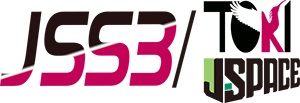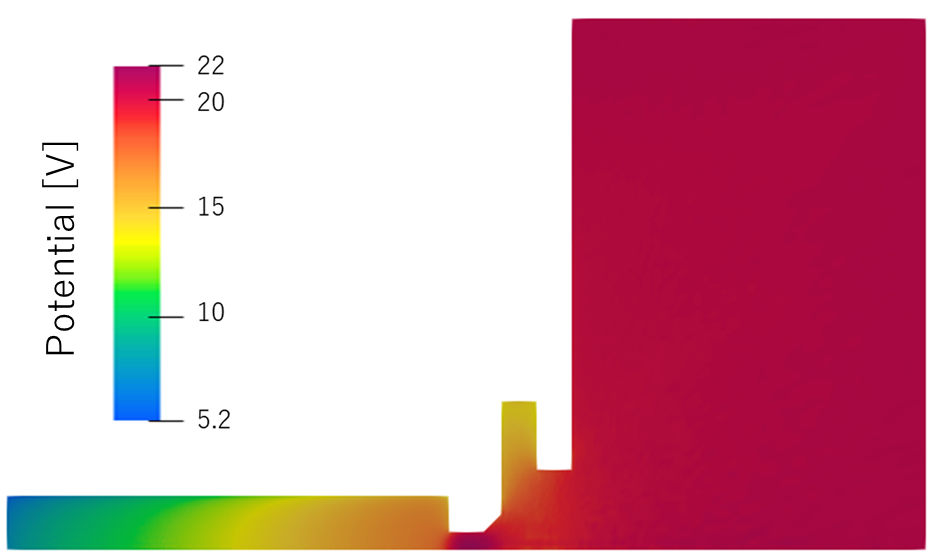Research on plasma analysis method in electric propulsion
JAXA Supercomputer System Annual Report February 2023-January 2024
Report Number: R23ECWU04
Subject Category: Cooperative Graduate School System
- Responsible Representative: Yasuhiro Mizobuchi, Aviation Technology Directorate, Aircraft Lifecycle Innovation Hub
- Contact Information: Kiyoshi Kinefuchi, Department of Aerospace Engineering, Graduate School of Engineering, Nagoya University(kiyoshi.kinefuchi@mae.nagoya-u.ac.jp)
- Members: Ryohei Takagi, Satoshi Inoue
Abstract
The objective of this study is to understand plasma physics phenomena in electric propulsion such as hollow cathode and MPD thruster. In order to investigate the distribution of plasma inside and outside the electric propulsion, which is difficult to measure with an electrostatic probe, the plasma flow inside and outside the electric propulsion device is analyzed by numerical simulation.
Reference URL
N/A
Reasons and benefits of using JAXA Supercomputer System
When analyzing the flow field in an electric propulsion thruster using the particle method, JSS3 enables us to perform the analysis under various conditions because of its very high computational power.
Achievements of the Year
Hollow cathodes have two operating states: spot mode, which is a stable operating state, and plume mode, which is an unstable operating state. In the plume mode, ionization instability causes discharge oscillations that adversely affect the operation of electric propulsion systems. In order to investigate the difference in plasma physics between the spot mode and the plume mode, the plasma flow inside and outside the hollow cathode was calculated using the hybrid-PIC method. The obtained plasma potential distribution is shown in (Fig.1). The plasma potential under the plume-mode-like operating condition were generally higher than those under the spot-mode-like operating condition, which was qualitatively consistent with the experimental trend.
In the numerical analysis of MPD thrusters, the plasma and neutral particles are conventionally treated as continuum. However, this method cannot capture the rapid increase in the Larmor radius of the ions due to the sudden decrease in the magnetic flux density. Therefore, we adopt the Hybrid-PIC method for numerical analysis. For the future particle method analysis of MPD thrusters, the DSMC method is applied to the arcjet thruster, which has many structural similarities with MPD thrusters and for which there are many known data. The validity of the obtained results is verified by comparing them with experimental data.
Publications
– Oral Presentations
Ryohei Takagi, Kiyoshi Kinefuchi, Sinatora Cho, Hiroki Watanabe, Hybrid-PIC simulation of plasma plume in hollow cathode, The 67th Space Science and Technology Union Conference, Oct. 2023.
Usage of JSS
Computational Information
- Process Parallelization Methods: MPI
- Thread Parallelization Methods: N/A
- Number of Processes: 12
- Elapsed Time per Case: 24 Hour(s)
JSS3 Resources Used
Fraction of Usage in Total Resources*1(%): 0.01
Details
Please refer to System Configuration of JSS3 for the system configuration and major specifications of JSS3.
| System Name | CPU Resources Used(Core x Hours) | Fraction of Usage*2(%) |
|---|---|---|
| TOKI-SORA | 0.00 | 0.00 |
| TOKI-ST | 70285.23 | 0.08 |
| TOKI-GP | 0.00 | 0.00 |
| TOKI-XM | 0.00 | 0.00 |
| TOKI-LM | 0.00 | 0.00 |
| TOKI-TST | 0.00 | 0.00 |
| TOKI-TGP | 0.00 | 0.00 |
| TOKI-TLM | 0.00 | 0.00 |
| File System Name | Storage Assigned(GiB) | Fraction of Usage*2(%) |
|---|---|---|
| /home | 1020.00 | 0.85 |
| /data and /data2 | 0.00 | 0.00 |
| /ssd | 0.00 | 0.00 |
| Archiver Name | Storage Used(TiB) | Fraction of Usage*2(%) |
|---|---|---|
| J-SPACE | 0.00 | 0.00 |
*1: Fraction of Usage in Total Resources: Weighted average of three resource types (Computing, File System, and Archiver).
*2: Fraction of Usage:Percentage of usage relative to each resource used in one year.
ISV Software Licenses Used
| ISV Software Licenses Used(Hours) | Fraction of Usage*2(%) | |
|---|---|---|
| ISV Software Licenses(Total) | 188.57 | 0.09 |
*2: Fraction of Usage:Percentage of usage relative to each resource used in one year.
JAXA Supercomputer System Annual Report February 2023-January 2024



